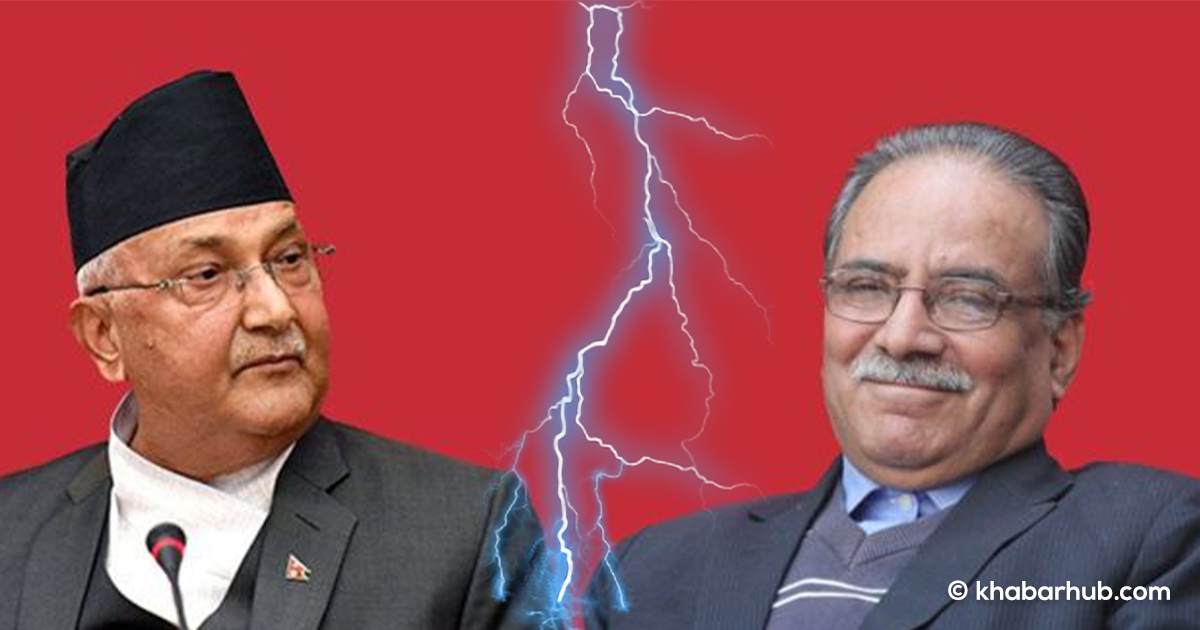0%

Prime Minister KP Oli (L) and Pushpa Kamal Dahal at odds.
KATHMANDU: Amid fears of government surveillance, senior leaders and politicians have begun using encrypted phone apps for communication as a tactic to avoid phone tapping and protect privacy.
The increased instances of phone-tapping in the country have troubled top leaders particularly at a time when Prime Minister KP Oli has been alleged of bringing divide in his own party – the ruling Nepal Communist Party (NCP).
“In fact, even top leaders, including NCP Chairman Pushpa Kamal Dahal, senior leaders Madhav Kumar Nepal, among others use encrypted apps while making voice calls to discuss meeting agendas and other issues,” an NCP leader conceded.
Top leaders fear that Prime Minister Oli could “misuse” the state authorities to listen to or monitor the real-time of their private conversation because of which the trend of holding a conversation on end-to-end encrypted messaging apps or in-person has gone up.
PM Oli, in recent times, has been alleged for “mis(using)” his power by using the National Investigation Department (NID) to carry out surveillance, and collect cellular communications of the top leaders, including NCP leaders, to track their movements and their activities.
Sources said NCP Chairman Pushpa Kamal Dahal “Prachanda” usually uses end-to-end encrypted calling apps Signal and WhatsApp.
Likewise, NCP senior leader Madhav Kumar Nepal uses WhatsApp and Viber for conversation as he, too, fears of phone-tapping.
Another senior party leader Jhala Nath Khanal, too, uses WhatsApp and Viber while making political and private conversation.
Sources said all NCP and Nepali Congress (NC) top leaders use WhatsApp, Signal, and Viber for internal communication, including sending messages as they fear PM Oli could instruct the government bodies, including the National Investigation Department (NID) –the country’s primary intelligence agency — to activate the surveillance system to track his rivals’ conversation.
They also fear that PM Oli has accrued some monitoring technologies and analyses team for collecting information, particularly his rivals.
However, the impact of phone tapping and recording is high within the leaders of the ruling NCP at a time when the party top leaders – Dahal and Oli – are involved in an intra-party row.
Sources also claim that PM Oli has mobilized his multi-disciplinary technical expertise and resources to gather information of his opponents, including conversation and interactions, amid the ongoing wrangling.
The scope of monitoring has been made so immense that it can instantly identify and ascertain his rivals’ strategy and to chart out his counter plan at the right time.
For instance, Energy Minister Barsa Man Pun is learned to have expressed concern with a delegation of left-wing engineers that the trend of taping phone calls has increased in recent times.
Barring a few, people, including ministers, top bureaucrats, security officials, opposition leaders, judges, senior journalists, among others, too, are using WhatsApp while making secret phone calls as well as discussing family-related stuff.
It may be noted that the Office of the Prime Minister drafted a “Special Service Act” as instructed by PM Oli, which was registered at the National Assembly in November last year.
Despite initial hue and cry from the main opposition party, Nepali Congress, the Bill was unanimously endorsed after amendment and got registered on December 11, 2019.
The law will allow intelligence officials to monitor and even intercept any suspicious audio conversation both at the individual and institutional levels.
Section 10 of the Bill has a provision of conducting surveillance, monitoring, and intercepting any critical information that is relayed from any means of communication and electronic devices such as audio, visual, or only from the signal from monitored persons, agencies and public means of communication.
That allows the collection of all information through supervision and interception of communication.
The Bill has given the right to the NID, which has come under the purview of the PM’s Office after Oli became the Prime Minister.
After the legal provision, Nepal’s intelligence agency has been focusing on and conducting intelligence at home and abroad. Sources claim the agency has also established counter-intelligence capability.
According to internal sources, the intelligence agency has been restructuring, strengthening, training and purchasing necessary equipment. In fact, the NID has already purchased some equipment for the same.
“Reforms have been taking place to enhance our intelligence capabilities after Prime Minister’s direct instruction,” a senior official at the NID told Khabarhub insisting anonymity.
As the government agencies continued with the surveillance on the government-owned Nepal Telecom and other private telecom, including Ncell, having their server in Nepal, leaders switched over to other encrypted ones having server abroad to make sure that their conversation do not leak.